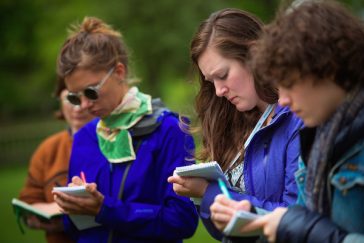 The daily news cycle moves at a dizzying pace, but the need for effective and trustworthy journalists is constant. According to a summary of studies relating to journalism and democracy Democracy Fund, “from saving lives to exposing corruption, local news produces many forms of public benefit that make our governments work better and our communities more sustainable.”
The daily news cycle moves at a dizzying pace, but the need for effective and trustworthy journalists is constant. According to a summary of studies relating to journalism and democracy Democracy Fund, “from saving lives to exposing corruption, local news produces many forms of public benefit that make our governments work better and our communities more sustainable.”
Recent studies have exposed crucial links between news reporting and civic responsibility and action. Results indicate that the loss of local U.S. newspapers over the past decade, combined with incomplete coverage on key issues, has reduced public participation in democratic systems, particularly voting. A 2015 study published by the Southern Political Science Association indicated that limited coverage of local political races resulted in fewer citizens who intended to vote and more who felt incapable of ranking elected or incoming officials.
Democracy’s Detectives: The Economics of Investigative Journalism, a 2017 book by Stanford researcher and former Grantham Prize juror, James T. Hamilton, points to numerous ways in which spending on quality journalism has saved on costs to society that otherwise would have been much greater. The scrutiny of the press is tied to less political corruption, more responsible spending, and even lower fossil fuel emissions. A 2018 analysis published in the Journal of Environmental Economics and Management revealed that U.S. consumer goods producers whose emissions were printed in local newspapers reduced their emissions by 29% compared to those not covered in the press.
These trends remind us of the importance of accurate and frequent environmental reporting. Watchdog reporting results in a higher level of corporate and governmental transparency and shows citizens how their opinions and actions matter. Metcalf Institute training is an important tool for local journalists across the nation, empowering them to cover complex science stories with the clarity and context that communities need to make informed decisions.
This article was written by Julia Rei, a Metcalf Institute science communication intern and undergraduate senior at URI double majoring in Writing and Rhetoric and Communication Disorders.
